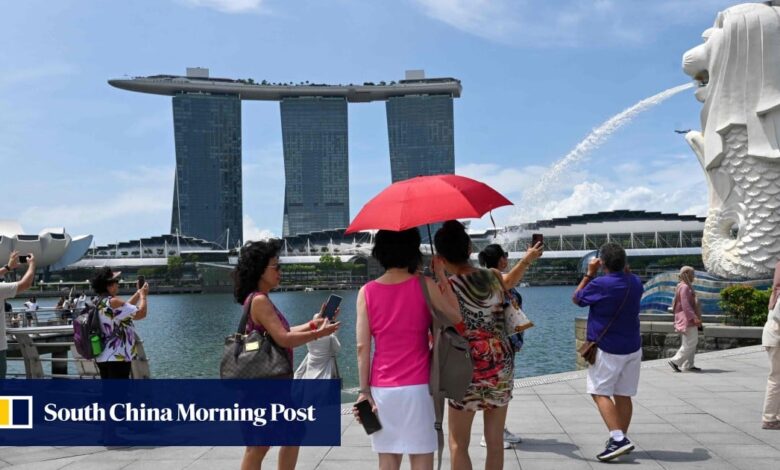Singapore’s economy grows as GDP expands, central bank keeps monetary policy unchanged

“Singapore’s GDP growth is expected to improve gradually over 2024,” the monetary authority said in the statement.
“However, the global economic outlook remains uncertain and the domestic recovery could be weaker than expected,” it said, judging the current appreciating path of the Singapore dollar’s nominal effective exchange rate to be sufficiently tight.
‘More still needs to be done’: how low-lying Singapore fights fast-rising seas
‘More still needs to be done’: how low-lying Singapore fights fast-rising seas
While the numbers signal that the city state’s recovery is gaining momentum, sustaining that performance depends on how well global demand for goods rebounds.
Singapore’s economic performance is often seen as a barometer of the global environment because of its reliance on international trade.
Also on Friday, Singapore’s central bank kept monetary settings unchanged for a second time this year amid waning core inflation, while increasing the frequency of its policy decisions to quarterly to be nimble in responding to evolving challenges.
The Monetary Authority of Singapore, which uses the exchange rate as its main policy tool rather than interest rates, maintained the slope, width, and centre of the currency band unchanged, it said in a statement. The decision to issue four policy statements a year from the current two is part of “continuing efforts to enhance monetary policy communications,” the MAS said.
The next monetary policy statement will be released in late January, it said.
The central bank guides the local dollar against a basket of its major trading partners and adjusts the pace of its appreciation or depreciation by changing the slope, width and centre of the currency band. It doesn’t disclose details of the basket, or the band or the pace of appreciation or depreciation.
The Singapore dollar held steady after the decision, which was predicted by all 18 economists in a Bloomberg survey.
Health of the economy is the main concern for policymakers now. The continuing contraction in exports, which are more than one-and-a-half times the island’s GDP, weighed on their minds as evident from the policy statement.
“In the near term, global final demand is expected to soften amid elevated interest rates,” the MAS said, adding that growth in Singapore’s major trading partners should gradually pick up later in 2024 although the timing and extent of recovery remain uncertain.
The MAS reiterated the government’s forecast for a full-year expansion of 0.5 per cent-1.5 per cent, saying growth is expected to come in at the lower half of that range. It expects core inflation to come in at around 4 per cent this year, and around 2.5 per cent-3.5 per cent in 2024.
Singaporeans ‘cringe’ over advice on discarding drink packet with founder’s image
Singaporeans ‘cringe’ over advice on discarding drink packet with founder’s image
Friday’s decision extends the MAS pause in April after five rounds of tightening between October of 2021 and 2022 to blunt the impact of imported inflation.
Even as price gains have trended lower, the monetary authority isn’t ready yet to a pivot to easing amid potential risks to price pressures.
Also, a one percentage point hike in a consumption tax will kick-in at the start of 2024. For now, the government has unveiled measures to shield citizens from higher costs of living.
Additional reporting by Agence France-Presse






